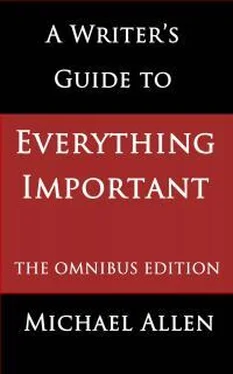Actually, no. For the most part, the idea that there are good books and bad books, in any absolute sense, is total nonsense. (For a discussion of this point, see A Writer’s Guide to Emotion. )
For the present, let us just note that there are plenty of people around who think that there is such a thing as a ‘good book’ (or play), that a ‘good judge’ can identify such a piece of work. Furthermore, there is no denying that literary reputation is something, like fame, that many writers strive to achieve. They want their books (or plays) to be admired by highbrow reviewers and they believe that the achievement of literary reputation is something worth aiming for.
How do you acquire literary reputation?
You acquire a literary reputation when the critics on the staff of highbrow quality newspapers, such as The Times and The New York Times , review your work in glowing terms. And this, I can assure you, does not usually happen without somebody making it happen. Publishers of literary fiction spend a lot of time and energy in softening up the opinion-formers on these leading journals. They send them news of forthcoming masterpieces months in advance, building up a sense of expectation. They take the leading critics out to dinner and introduce them to the author.
Perhaps even more important in establishing a literary reputation are the key weekly or monthly journals which are read by the (largely self-appointed) literary elite.
At one time, a review in The Times Literary Supplement could make or break your reputation, and that weekly journal is still very influential today. There are also much less well-known publications which in any given year will be helpful in establishing your name – the London Review of Books and the Literary Review are two British examples. I am told that Granta also carries weight. In the USA, of course, we start with the New York Times Book Review.
The reviews of your book, when they appear, will be read by you and your publisher with great attention. Rave reviews in the right media provide instant literary reputation; respectful reviews provide a platform on which a reputation may gradually be built; and even negative reviews may be valuable if they are somehow ‘controversial’ and can be regarded as evidence of originality or daring on your part.
But you can’t have everything
Sorry, darlings, but you cannot reasonably expect to have your literary reputation and the money as well. Implacable rule of the universe.
Yes I know there are exceptions, and let us deal with the exceptions first. Ernest Hemingway, for example, won the Nobel prize for literature (which is as classy as you can get in the literary world). He also made a huge fortune, and he was photographed so often that he was recognised and lionised wherever he went. He had money, fame, and literary reputation. But you, dear Reader, are not going to achieve all that. Believe me.
Let me demonstrate the point about the incompatibility of literary reputation and money. Josephine Cox is a British lady who writes what is known in the book trade as ‘women’s fiction’ or sagas. Her novels usually tell the story of a young girl making her way through life against all kinds of adversity. For many years Ms Cox produced, on average, two books a year, and they almost invariably turned up in the list of the 100 bestselling paperbacks of the year. In 1996, for example, Living a Lie was placed 44th, and The Devil You Know came 48th. (Total sales 414,000 copies.)
These books obviously do very well financially, and Ms Cox’s bank manager no doubt knows her name and smiles at her warmly whenever she enters his premises. But what to do the reviewers in the ‘serious’ press think of her?
Not much. In fact, she has been publicly sneered at. The Times condescended to review Living a Lie by Josephine Cox on 16 September 1995. I say condescended because they don’t usually bother to review books of this kind at all.
Anyway, the review of Living a Lie was not kind. The heading was ‘Truth to tell, it stinks.’ The reviewer began by saying ‘I want to be nice. I want to say that it does not matter that the title is hammy, the characters mere ciphers and the writing laboured and superficial. I want to say that I quite enjoyed this book despite all that. But I cannot, because I did not.’
It gets worse.
‘Cox’s prose is simpering, wishy-washy and full of monstrous clichés…. All behaviour is motivated by simple emotions, like love and hate.’ (The reviewer might have been better advised to write ‘such as’ love and hate, but let us not quibble.) Ms Cox, says the reviewer, has produced a ‘simplistic fairy-tale. That is fine if you like them, and thousands do; which makes it pretty irrelevant that I do not.’
Quite.
Let’s take an American example. One of the biggest fiction sellers in recent years was The Bridges of Madison County by Robert James Waller. American reviewers generally hated it. It was, one said, ‘the worst book in living memory’, and another referred to Waller’s ‘abysmal prose’.
The book’s commercial success was due to word-of-mouth recommendation. People read it, enjoyed it, and told their friends about it.
‘I know people who bought 30 copies,’ says the author. ‘By February 1993 it was at number one in the bestsellers chart and it stayed there for 56 weeks until my second book came out. The New York literati went absolutely ballistic.’
If there’s one thing that the literary ‘experts’ cannot abide, it’s people buying and enjoying a ‘bad’ book. The author of The Bridges of Madison County is quite bitter about ‘the elitist, so-called intelligentsia who seem to think that they are the only intelligent people in the world.’ But he has some consolation. Readers have written to him to say, ‘Thank you for changing my life.’
To summarise: we have established that commercially successful books get sneered at and frequently have no literary reputation whatever.
We should now note that the reverse is also normally the case: that is to say, books which are much admired by the intelligentsia do not usually achieve big sales figures. Even Salman Rushdie’s first novel sold only 800 copies in hardback; all the unsold copies had to be pulped.
‘Literature?’ remarked the editor of one American journal, who had learnt the truth the hard way. ‘The stuff just don’t sell. Sometimes you can’t even give it away.’
The origins of literary snobbery
By now you will have gathered that I do not recommend that you aim to achieve literary reputation. To my mind, it is worthless in and of itself. Even if you succeed, all you end up with is the respect of a bunch of people whose opinions, in my view, are usually half-baked and invariably arrogant.
Nevertheless… Despite all that… It would be nice, wouldn’t it, if you could just earn a slice of that Success Cake? Have a nibble of it now and then, and decide for yourself whether you like the taste of it or not.
OK. I’ll grant you that. And I’ll do more. In Part 4 I will even reveal to you The Secret of Success. (This is worth the price of the book, all on its own.)
But first… In Part 3 we really ought to consider, for our own sakes, what it is that lies behind the motivation of so many writers.
PART 3: SUCCESS – Why do we seek it?
3.1 Human psychology in general
I think it’s worth reminding you that when I was a young man we were still in the 1950s. And that was a time when people still believed in Freud – which, by and large, I don’t think they do now. Anyway, since I had lots of ideas about becoming a writer, I thought I had better try to find out as much about human psychology as I could.
Читать дальше












